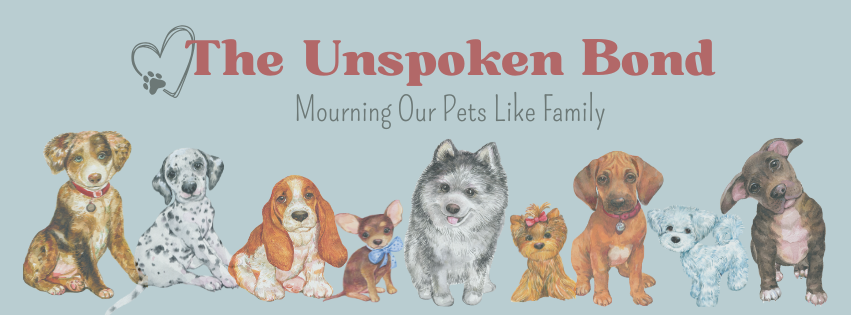By Hailey Gallagher, Social Work Intern, with review and editing by Dr. Ashley Barksdale.

Why Grieving a Pet Is a Unique Experience
Losing a pet is unlike any other kind of grief because the bond between humans and their animal companions is deeply personal and unconditional. Pets often provide companionship free of judgment, offering comfort, routine, and love in ways that people sometimes cannot. For many, a pet is not just an animal but a family member, confidant, and daily presence woven into life’s rhythms. Their absence is therefore profoundly felt in both emotional and practical ways.
The grief that follows pet loss can be uniquely challenging because it is sometimes dismissed or minimized by others. Society tends to place more emphasis on human loss, leaving those mourning a pet to feel isolated or as though their pain is less valid. This lack of recognition, often referred to as disenfranchised grief, can make healing even harder (Park et al., 2023). The reality, however, is that grieving a pet can be just as intense and consuming as grieving a human loved one.
Another unique aspect of pet loss is the role of routine and responsibility in the relationship. Daily activities such as feeding, walking, grooming, or simply being greeted at the door are suddenly gone, leaving behind empty spaces that serve as constant reminders of the pet’s absence. This disruption in routine often intensifies grief, as the loss is felt not only emotionally but also physically in the structure of daily life.
Finally, the experience of pet loss carries with it a powerful element of love and memory. Many people find comfort in reflecting on the joy, laughter, and comfort their pet brought into their lives. Honoring these memories—through photos, rituals, or sharing stories—can transform grief into a form of gratitude. While the pain of loss may never fully disappear, it can evolve into a deep appreciation for the bond that was shared, highlighting how special and irreplaceable the relationship truly was.

“We who choose to surround ourselves with lives even more temporary than our own, live within a fragile circle; easily and often breached… We cherish memory as the only certain immortality, never fully understanding the necessary plan.”
—Irving Townsend, The Once Again Prince, in Separate Lifetimes (1986)
Different Stages of Grief
Grieving a pet can mirror the stages of grief commonly described in human loss, though the journey is deeply personal and does not follow a linear path.
- Denial often softens the shock, making it hard to believe your companion is truly gone.
- Anger or frustration may surface next, sometimes directed at the circumstances, yourself, or others who do not fully understand your pain.
- Bargaining can follow, filled with “what if” thoughts and wishes that things could have been different.
- Depression may settle in as daily routines and quiet moments highlight the absence of your pet.
- Acceptance emerges over time. This does not mean forgetting, but rather learning to live with the loss while holding onto the love and memories.
Many people also find comfort in the idea of continuing bonds—keeping their pet’s presence alive through rituals, photos, or simply carrying their spirit forward in everyday life (Leonhardt-Parr & Rumble, 2024).
Looking Ahead With Love and Remembrance
Moving forward after the loss of a beloved pet does not mean forgetting the joy and love they brought into your life. Looking ahead with love and remembrance involves honoring their memory while allowing yourself to heal. This may include creating rituals, displaying photos, telling stories, or establishing a special space in your home to celebrate the bond you shared.
By holding onto positive memories and the lessons of companionship, you can carry your pet’s spirit with you in daily life. Embracing this balance of grief and gratitude allows healing while keeping the love you shared alive—shaping a path forward that honors both your loss and the enduring connection you will always have.

How The Well Can Help
At The Well: Family Support, we recognize that pet loss is deeply significant. Our services include:
- Individual Counseling – One-on-one support to process the emotions tied to losing a beloved pet.
- Family or Household Support – Helping family members, including children, share feelings and cope together.
- Child and Adolescent Support – Age-appropriate guidance to help young clients understand death and express grief.
- Trauma-Informed Care – Addressing intense emotions or unexpected grief reactions with safe, structured support.
- Faith-Integrated Coping – Using spiritual beliefs or practices for comfort, meaning, and healing.
- Psychoeducation on Pet Loss – Educating clients about normal grief reactions and coping strategies.
- Peer or Group Support – Connecting with others who have experienced similar losses.
- Resource Referral – Guidance toward local or online pet loss support groups, memorial services, or community resources.

Resources
American Veterinary Medical Association. (n.d.). Coping with the loss of a pet. https://www.avma.org/resources-tools/pet-owners/petcare/coping-loss-pet
Best Friends Animal Society. (n.d.). Coping with pet loss: Healing strategies. https://bestfriends.org/pet-care-resources/coping-pet-loss-healing-strategies
Pet Parent Grief Support. (n.d.). Pet parent grief support resources. https://www.petparentgriefsupport.com
References
Leonhardt-Parr, E., & Rumble, B. (2024). Coping with animal companion loss: A thematic analysis of pet bereavement counselling. OMEGA—Journal of Death and Dying, 89(1), 362–378. https://doi.org/10.1177/00302228211073217
Park, R. M., Royal, K. D., & Gruen, M. E. (2023). A literature review: Pet bereavement and coping mechanisms. Journal of Applied Animal Welfare Science, 26(3), 285–299. https://doi.org/10.1080/10888705.2021.1934839
Townsend, I. (1986). Separate lifetimes. J. N. Townsend Publishing.
